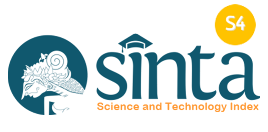ANALISIS POTENSI PERPUSTAKAAN PADA FENOMENA OVERSHARING DI MASYARAKAT
DOI:
https://doi.org/10.24269/pls.v6i1.4347Abstract
Abstract
Social media is one of the places to be able to access information, it is so popularly used by the people of Indonesia. In addition to being able to access existing information, users can also share any information the findings from Ipos state that Indonesia is ranked 2nd in the behavior of sharing anything on social media, unfortunately many of them do not understand the dangers of excessive sharing of privacy on social media which is known as oversharing. The role of an institution is needed to be able to educate about privacy to the public. Institutions that have this potential are libraries. This is the background of this study to further analyze the potential of libraries on the phenomenon of oversharing in society. The method used is library research or literature study, namely bibliographic research and scientific systematics which include collecting bibliographic materials including books or other readings related to the research objectives. The results of the study show that the library as an information provider with high credibility has the potential to be the front line to the protector for users related to privacy on social media. Libraries can raise awareness little by little about the importance of protecting personal information on social media. Thus, users can know and understand the consequences and potential of various publicly available information. For this reason, further user education that can be held by the library regarding privacy literacy is needed to be able to explain and explain the existing understanding of privacy literacy.
Abstrak
Media sosial menjadi salah satu tempat untuk dapat mengakses informasi, begitu populer digunakan oleh masyarakat Indonesia. Selain dapat mengakses informasi yang ada pengguna juga dapat membagikan informasi apa saja. Temuan dari Ipos menyebutkan Indonesia berada pada peringkat 2 pada perilaku membagikan apa saja di media sosial, sayangnya banyak dari mereka tidak memahami bahayanya jika berlebihan membagikan privasi di media sosial yang dikenal dengan oversharing. Dibutuhkannya peran suatu lembaga untuk dapat mengedukasi perihal privasi ke masyarakat. Lembaga yang memiliki potensi tersebut adalah perpustakaan. Hal tersebut yang melatarbelakangi penelitian ini untuk menganalisis lebih lanjut mengenai potensi perpustakaan pada fenomena oversharing di masyarakat. Metode yang digunakan menggunakan metode penelitian kajian pustaka atau studi kepustakaan, yaitu cara penelitian bibliografi serta sistematis ilmiah yang meliputi, mengumpulkan bahan bahan bibliografi diantaranya adalah buku ataupun bacaan lainnya yang berkaitan dengan sasaran penelitian. Hasil dari penelitian menunjukkan bahwa perpustakaan sebagai penyedia informasi dengan kredibilitas yang tinggi memiliki potensi menjadi garda terdepan sampai dengan pelindung bagi pemustaka terkait dengan privasi di media sosial. Perpustakaan dapat menyadarkan sedikit demi sedikit mengenai pentingnya melindungi informasi pribadi di media social. Dengan demikian, pemustaka dapat mengetahui dan memahami konsekuensi dan potensi dari berbagai informasi yang ada secara publik. Untuk itu, diperlukanedukasi pemustaka lebih lanjut yang dapat diselenggarakan oleh perpustakaan mengenai literasi privasi untuk dapat menjelaskan dan memaparkan mengenai pemahaman literasi privasi yang ada.
References
Basuki, S. (2019). Etika Informasi. Media Pustakawan, 26(1), 1–8. https://doi.org/10.37014/medpus.v26i1.171
Cotter, K., & Sasso, M. D. (2016). Libraries Protecting Privacy on Social Media: Sharing without" Oversharing". Pennsylvania Libraries: Research & Practice, 4(2), 73–89.
COVID-19, W. R. P. (n.d.). Berita Terkini | Satgas Penanganan Covid-19. Covid19.Go.Id. Retrieved October 21, 2021, from https://covid19.go.id/berita/kartu-vaksin-tidak-perlu-dicetak-ini-alasanya
Danandjaja, J. (2014). Metode Penelitian Kepustakaan. Antropologi Indonesia.
Digital 2021: The latest insights into the ‘state of digital.’ (2021, January 27). We Are Social UK. https://wearesocial.com/uk/blog/2021/01/digital-2021-the-latest-insights-into-the-state-of-digital/
Fuchs, C. (2014). Social Media: A Critical Introduction. https://doi.org/10.4135/9781446270066
Gressel, M. (2014). Are libraries doing enough to safeguard their patrons’ digital privacy? The Serials Librarian, 67(2), 137–142.
Handlin, A. (2014). Dirty Deals? An Encyclopedia of Lobbying, Political Influence, and Corruption [3 volumes]: An Encyclopedia of Lobbying, Political Influence, and Corruption. ABC-CLIO.
Laughey, D. (2007). Key themes in media theory. McGraw-Hill Education (UK).
McQuail, D. (2003). Media accountability and freedom of publication. Oxford University Press, USA.
Naibaho, K. (2007). Menciptakan Generasi Literat Melalui Perpustakaan. Visi Pustaka, 9(3), 1–8.
Nasrullah, R. (2016). Teori dan riset media siber (cybermedia). Kencana.
Nasution, M. H. (2019). Tindak Pidana Pelanggaran Privasi di Media Sosial [Universitas Sumatera Utara]. https://repositori.usu.ac.id/handle/123456789/16220
UNDANG-UNDANG REPUBLIK INDONESIA NOMOR 19 TAHUN 2016 TENTANG PERUBAHAN ATAS UNDANG-UNDANG NOMOR 11 TAHUN 2OO8 TENTANG INFORMASI DAN TRANSAKSI ELEKTRONIK, Pub. L. No. Nomor 19 Tahun 2016.
Putra, K. A. D., & Hidayatullah, F. (2020). LITERASI PRIVASI SEBAGAI UPAYA MENCEGAH PELANGGARAN DI ERA MASYARAKAT JARINGAN. JURNAL SIGNAL, 8(2), 195–202. https://doi.org/10.33603/signal.v8i2.3447
Reitz, J. M. (2004). Dictionary for library and information science. Libraries Unlimited.
Downloads
Published
How to Cite
Issue
Section
License
Licence
This Journal will place Author as Copyright Holder, The non-commercial use of the article will be governed by the Creative Commons Attribution license as currently displayed on Creative Commons Attribution-NonCommercial-ShareAlike 4.0 International License.

Author(s)' Warranties
The author warrants that the article is original, written by stated author(s), has not been published before, contains no unlawful statements, does not infringe the rights of others, is subject to copyright that is vested exclusively in the author and free of any third party rights, and that any necessary written permissions to quote from other sources have been obtained by the author(s).
Plagiarism Notice
PUBLIS Editorial board recognizes that plagiarism is not acceptable and therefore establishes the following policy stating specific actions (penalties) upon identification of plagiarism/similarities in articles submitted for publication in PUBLIS. PUBLIS will use Turnitin's originality checking software as the tool in detecting similarities of texts in article manuscripts and the final version articles ready for publication. A maximum of 30% of similarities is allowed for the submitted papers. Should we find more than 30% of the similarity index, the article will be returned to the author for correction and resubmission.

_baru.png)










